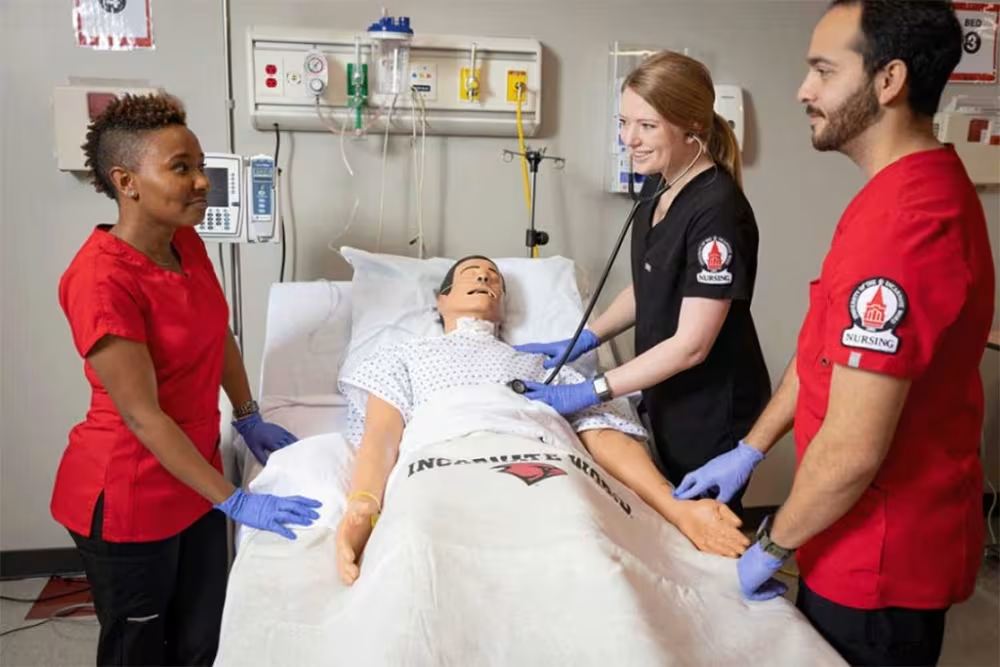How to Become an NP in 4 Steps
Each blog post is dated and contains accurate information as of that date. Certain information may have changed since the blog post publication date. If you would like to confirm the current accuracy of blog information, please visit our ABSN track overview page or contact us at 855-831-3745.
Nurse practitioners are advanced practice registered nurses who work with specific populations. If you want to become an NP, understanding how to become an NP helps you plan your future accordingly. The process involves earning your BSN and nursing license and gaining clinical experience before entering an NP-focused graduate program.

As you explore your nursing career options, you may find that becoming a nurse practitioner (NP) is the path for you. If you’re wondering how to become an NP, you can take the first step by earning a Bachelor of Science in Nursing (BSN) through the University of Incarnate Word’s (UIW) Accelerated Bachelor of Science in Nursing (ABSN) track.
What is a nurse practitioner, and what do nurse practitioners do? An NP is an advanced practice nurse who works within a specialty population, diagnosing patients, prescribing medications and creating treatment plans.
But how long does it take to become an NP? The answer depends on your previous education history and your graduate program of choice. Below is an exploration of how to become an NP to help you plan your future.
1. Earn a BSN

Nurse practitioner schooling starts with earning a BSN. You can apply for a traditional, four-year BSN program with a high school diploma or equivalent. A BSN program covers nursing theory and practice, combining classwork with experiential learning, such as simulation labs and clinical rotations.
If you have previous college experience or a bachelor’s degree, you may be eligible for an accelerated BSN track, such as UIW’s ABSN. Our ABSN builds off your previous education and provides a comprehensive curriculum of the same quality as a traditional four-year program so that you can earn a BSN in as few as 16 months.

If you have previous college experience, accelerated nursing programs can help you become a nurse fast. Read more to learn about accelerated nursing programs.
2. Obtain a Nursing License
Once you’ve earned a BSN, you can take the National Council Licensure Examination for Registered Nurses (NCLEX-RN). The NCLEX-RN assesses your clinical judgment, requiring you to apply your knowledge rather than memorize facts. Once you pass the NCLEX-RN, you can apply for your nursing license and begin practicing as a registered nurse.
3. Enroll in a Graduate Program
After earning a BSN and nursing license, you can enroll in a graduate program with an NP focus and choose a population specialty (e.g., pediatric, family, gerontology.) An NP program prepares nurses to perform NP duties, such as diagnosing, treating patients and managing and prescribing medications.
There are Master of Science in Nursing (MSN) programs, which typically take one to two years to complete, and Doctor of Nursing Practice (DNP) programs, which take three to five years.
Some NP graduate programs are BSN to MSN, BSN to DNP or MSN to DNP; however, many programs require you to acquire one to two years of clinical experience before enrolling. It’s essential to carefully research programs to find the right fit for you.
Nursing school is demanding but not impossible. Read more to learn eight pieces of advice for nursing students so you can rise and meet the challenges.

4. Obtain an NP Certification
The next step is to earn certification from a National Certification Board. Every state has different NP licensing requirements; however, all NPs must pass a licensing exam first. NP licensing exams assess your competency in delivering advanced practice clinical care and focus population.
You can only receive licensure in the state where you earned your degree. Once you pass the exam, earn your NP license and meet other state requirements, you can start working as an NP.
Start Your NP Journey with UIW
NPs are always in demand. According to the U.S. Bureau of Labor Statistics, the demand for NPs is expected to grow 38% between 2022 and 2032, significantly higher than the national average for all other occupations. While earning the degrees needed to be eligible for NP licensure takes years, it’s worth it.

Now that you know how to become an NP, you can take the steps toward accomplishing your goal. If you have a non-nursing bachelor’s degree or at least 60 college credits from an accredited institution, you can start your NP journey with UIW. Through our ABSN track, you can earn your BSN in as few as 16 months. Contact an admissions counselor today to learn more about our ABSN and how you can take the next steps.
